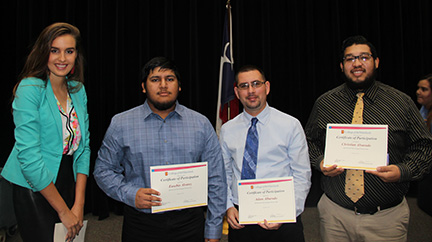From MLK to JFK, finalists reprise famous speeches

“Mr. Gorbachev, tear down this wall.”
Isabella Delgado’s speech ended with the famous line punctuated with podium pounding from former President Ronald Reagan’s June 12, 1987, speech in Berlin.
“It was a very empowering and emotional speech,” said Delgado, a theatre major. “I worked with theatre artistic director H. Russ Brown how to pretend you’re calm when you’re not and pretend you’re the person giving the message. I felt like I could connect with [Reagan].”
She was among four students to present speeches at the fourth annual Words That Changed History finals Nov. 3. Students auditioned to reprise famous orations as part of the college’s quality enhancement plan to provide opportunities for students to present and listen to outstanding speeches.
Eusebio Alvarez, of Dickinson, selected Martin Luther King Jr.’s powerful “I Have a Dream” speech for its timeliness.
“It’s still relevant today. There still is racism and its effects,” said Alvarez, a general studies major.
Christian Alvarado, of Texas City, presented former President John F. Kennedy’s inaugural address and call to unity with the line “And so, my fellow Americans: ask not what your country can do for you – ask what you can do for your country.”
“With everything going on in politics, JFK’s speech is relevant now. Plus JFK and Lincoln are my favorite presidents,” said Alvarado.
Adam Albarado, of League City, presented Gen. Douglas MacArthur’s farewell address to Congress “Old Soldiers Never Die” after researching MacArthur and his time.
“I’m a veteran. He was in the military,” said Albarado. “This is the biggest speech I’ve ever done. I learned speaking is not as hard as people think. It helped me gain better self-confidence.”
This spring outstanding students nominated by their professors will participate in the QEP Speech Contest.
"The QEP goal is to improve students’ speaking skills in formal settings or one-on-one situations such as interviews,” said professor and QEP chair Gilchrist White. “Words That Changed History showcases important speeches from the past and demonstrates the power of words on a local, global and personal scale.”
For more information, visit www.com.edu/qep.
